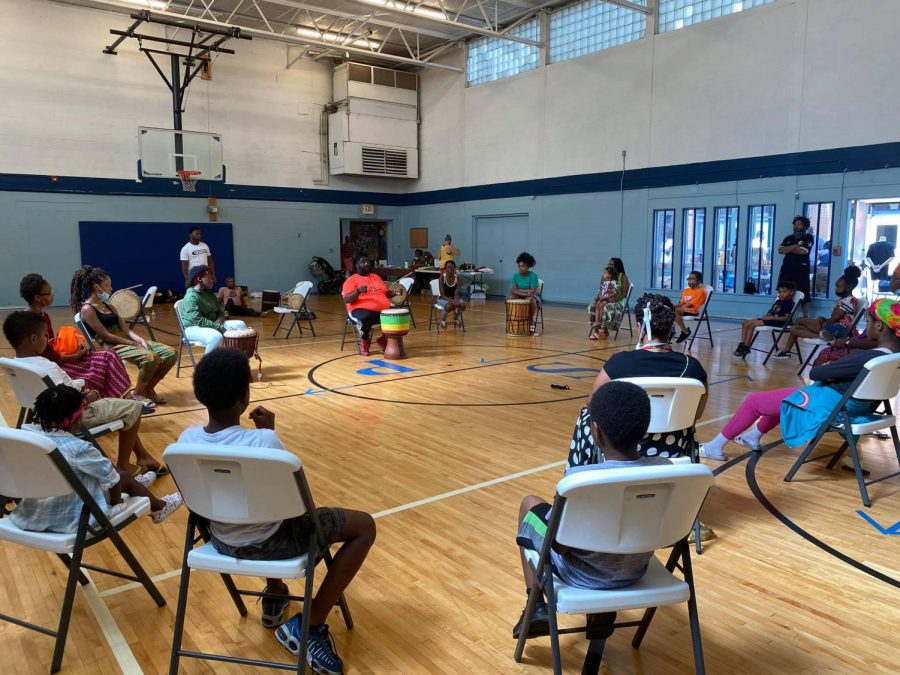Djapo Cultural Arts Institute Shares Art of the Afrikan Diaspora
Djapo community gathers at the Fall 2020 Open House
Every Saturday, the sounds of West Afrikan drumming and dancing feet reverberate from St. Paul’s Community Church in Cleveland. Organized by the Djapo Cultural Arts Institute, the classes hosted here bring together people of all ages and backgrounds through traditional Afrikan Diasporic dance and music. In addition to leading these community classes, Djapo also has a professional dance company, runs a “Rite of Passage” educational program for young Cleveland residents, travels all over the world, and frequently collaborates with the College’s Dance department.
Djapo’s Executive Artistic Director and Choreographer Talise A. Campbell founded the organization 12 years ago. Campbell is also a visiting assistant professor of Afrikana Studies and Dance at Oberlin. Throughout the organization’s evolution, she has stayed true to the company’s name, “Djapo,” which comes from the Wolof word for “together.”
“My main goal is really to unify — to use my genre of dance and culture to unify and to bring people together and to preserve culture,” Campbell said. “Afrikan traditions aren’t always something that is written down, so for us to be able to preserve those in creative ways just brings me so much joy.”
Weedie Braimah, Musical Director and Djembefola of Djapo, is an expert in both rhythm and folklore. As he sees it, Djapo preserves the cultural traditions of West Afrika by bringing dance to the Cleveland area with a transformative and healing spirit.
“One thing I can say is that we’ve been able to bring a [unique] style of folklore to the masses,” Braimah said. “Talise has been a part of change in this culture — not just at Oberlin, I’m talking about West Afrikan dance culture in general. I really feel that she’s been able to open up a door for people to see a new style of how we approach this folklore — whether it’s through education at the collegiate level, whether it’s through the drumming, whether it’s through the dancing — and I really admire that.”
Khalid Taylor, OC ’17, has performed with Djapo and worked closely with the institute during his tenure as a program coordinator at the College’s Multicultural Resource Center. Working among his community, Taylor used his experience with Djapo to bridge the gaps between the institute and the College by amplifying Djapo events, sharing resources, and bringing visiting artists to Oberlin. To Taylor, Djapo’s ability to navigate different settings and environments through dance is a big part of what makes it special.
“Djapo has a commitment to engaging with the community and performing in different spaces — not just on the main stage, but also in libraries and different community centers — and to doing outreach to bring in people to learn, whether that’s a one-time thing or a more consistent series,” Taylor said. “They make it so that [Afrikan diaspora art is] an accessible art, which I think is so important these days.”
Taylor also highlighted Djapo’s focus on building artistic community within the company and sharing that spirit among broader communities.
“Sometimes art can be removed from the people — when it’s really about people,” Taylor said. “You can’t have art without the people that make it and that it comes from, and I think that Djapo does a lot of work to make sure that West Afrikan art can be for everybody.”
Since Campbell joined the Oberlin faculty in 2017, she and her organization have both rigorously expanded the options available for Dance students to engage with the surrounding community and beyond.
“In Djapo, I found a truly unique and vibrant family and community that uses dance as a tool to celebrate life, culture, and history, spreading hope, healing, and strength through cultural exploration and dance,” wrote College fourth-year Blessing Dzikamai Bwititi in a message to the Review.
Bwititi holds Djapo close to his heart. After he performed in the 2019 joint showcase between Djapo and the College, he went on to receive a sponsorship from Djapo to travel to Ghana and Senegal for Winter Term 2020 with a group of eight other Oberlin students, led by Campbell and Braimah.
“My experience with Djapo has not only made me grow as a dancer but it has also allowed me to connect with so many parts of my inner-self and truly shaped my personal and spiritual growth over the years,” he wrote.
Djapo’s schedule for community classes is available on their official website, and you can check the group’s Facebook page for more updates on performances and classes. To support Djapo’s work spreading Diasporic Afrikan art in the Cleveland metropolitan area and beyond, you can click here.










